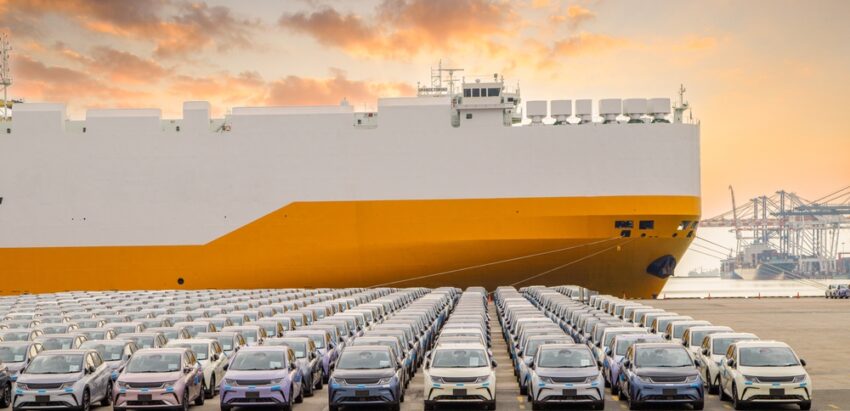The European Union has recently elected to impose tariffs on electric vehicles imported from China. This landmark decision reflects the EU’s strategy to combat perceived unfair trade practices, notwithstanding Germany’s dissent.
The tariffs, which could rise significantly, highlight the complex dynamics within European politics and industry. As nations navigate economic interests, this move underscores a pivotal moment for EU-China trade relations.
Overview of the Tariff Decision
The European Union has decided to levy tariffs on Chinese electric vehicles in an attempt to address perceived unfair subsidies. The decision was met with significant resistance from Germany, one of the EU’s major economies and a key player in the automotive industry. Despite Germany’s opposition, countries such as France, Italy, and Poland successfully advocated for these tariffs, which could reach as high as 35.3% for some vehicles.
This move suggests a strategic positioning by the EU to protect its automotive sector. Germany, Hungary, Slovakia, Slovenia, and Malta opposed the tariffs, concerned about potential repercussions. Meanwhile, twelve other member states, including Spain, chose to abstain. The tariffs are scheduled to last up to five years, contingent on potential policy adaptations following discussions with China.
The German Opposition
Germany’s automotive industry is notably concerned about the potential repercussions of these tariffs on the European economy. Oliver Zipse, CEO of BMW, has voiced his apprehension, labelling the tariffs a ‘fatal signal’ for the industry. He argues that such measures could inadvertently trigger a trade conflict that may harm both the European and Chinese markets.
Despite the imposition of tariffs, Germany’s strong opposition is seen as a positive indication of future negotiations. It highlights Germany’s commitment to seeking a peaceful resolution, hoping for a compromise that spares the automotive sector from severe economic disruptions.
Support from Other EU Nations
In contrast to Germany, other European nations have shown their support for the tariffs, seeing them as necessary for fair competition. The French automotive sector, for instance, has endorsed the tariffs, arguing that they help level the playing field. A spokesperson from Plateforme Automobile stated, ‘We are in favour of free trade but within the framework of fair rules.’
This sentiment reflects a broader desire within Europe to shield its industries from perceived unfair practices that could undermine local manufacturing. The decision underscores a pragmatic approach from these nations, balancing free trade ideals with protective measures.
Potential Chinese Retaliation
China has responded to the EU’s decision with promises of retaliatory actions, considering tariffs on European imports such as brandy, and assessing European pork and dairy products. Beijing’s Commerce Ministry has criticised the EU’s actions as protectionist, demanding a return to more cooperative trade practices.
The spectre of a trade conflict looms large, as both sides prepare for what could be a significant economic battle. This development could alter trade dynamics between Europe and China, potentially impacting various industries beyond automotive.
Long-term Implications for the Automotive Sector
The introduction of these tariffs is likely to drive Chinese electric vehicle and battery manufacturers to invest more heavily within the EU. By establishing production facilities in Europe, these companies might circumvent the tariffs, thereby fostering local employment and technology exchange.
While the immediate focus is on automotive, the broader economic effects could be transformative. New investments could emerge, altering the landscape of Europe’s technological capabilities and competitiveness in the global market.
In conclusion, the move by the EU is a calculated risk with both challenges and potential benefits. As negotiations progress, the outcomes will be critical to shaping the future of European and global automotive markets.
Negotiations and Future Prospects
Diplomats in the EU are optimistic that further discussions with China might lead to a resolution that could mitigate the impact of the tariffs. There’s hope that ongoing dialogue will foster mutual understanding and prevent a full-scale trade war that benefits no one.
The EU has set a deadline until the end of the month for these crucial talks, underscoring the urgency of the situation. A resolution could pave the way for more stable trade relations, ensuring the continued growth of the EU’s automotive industry.
Germany’s Role in Future EU Trade Policies
Germany’s significant role in the EU’s economic landscape places it at the heart of future trade policy discussions. Its opposition to these tariffs signals its commitment to collaborative economic strategies within the EU, promoting unity while addressing member states’ diverse needs.
The EU’s imposition of tariffs on Chinese electric vehicles marks a significant chapter in international trade relations. As European nations strategise amidst economic challenges, the global automotive market faces potential transformation.
How the EU and China address these tariffs will be crucial for future trade dialogues, highlighting the need for balance between protectionism and fair market practices.


